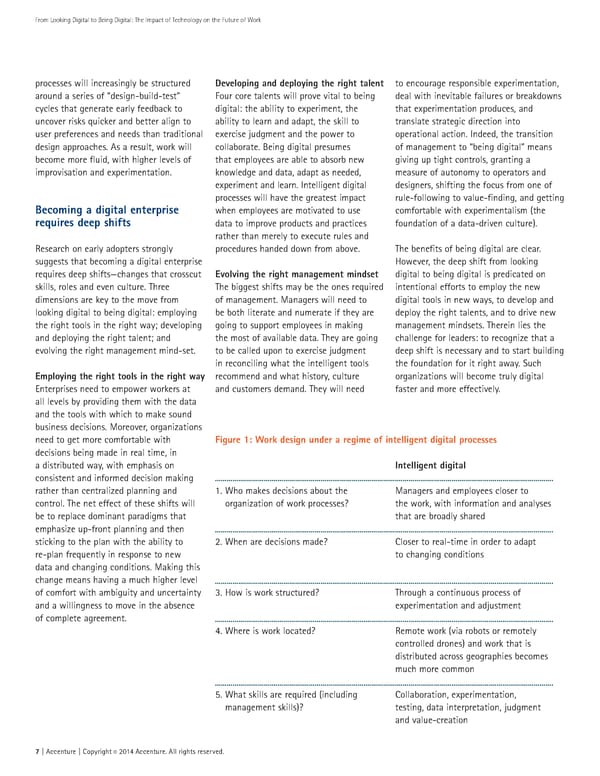From Looking Digital to Being Digital: The Impact of Technology on the Future of Work processes will increasingly be structured Developing and deploying the right talent to encourage responsible experimentation, around a series of “design-build-test” Four core talents will prove vital to being deal with inevitable failures or breakdowns cycles that generate early feedback to digital: the ability to experiment, the that experimentation produces, and uncover risks quicker and better align to ability to learn and adapt, the skill to translate strategic direction into user preferences and needs than traditional exercise judgment and the power to operational action. Indeed, the transition design approaches. As a result, work will collaborate. Being digital presumes of management to “being digital” means become more fluid, with higher levels of that employees are able to absorb new giving up tight controls, granting a improvisation and experimentation. knowledge and data, adapt as needed, measure of autonomy to operators and experiment and learn. Intelligent digital designers, shifting the focus from one of processes will have the greatest impact rule-following to value-finding, and getting Becoming a digital enterprise when employees are motivated to use comfortable with experimentalism (the requires deep shifts data to improve products and practices foundation of a data-driven culture). rather than merely to execute rules and Research on early adopters strongly procedures handed down from above. The benefits of being digital are clear. suggests that becoming a digital enterprise However, the deep shift from looking requires deep shifts—changes that crosscut Evolving the right management mindset digital to being digital is predicated on skills, roles and even culture. Three The biggest shifts may be the ones required intentional efforts to employ the new dimensions are key to the move from of management. Managers will need to digital tools in new ways, to develop and looking digital to being digital: employing be both literate and numerate if they are deploy the right talents, and to drive new the right tools in the right way; developing going to support employees in making management mindsets. Therein lies the and deploying the right talent; and the most of available data. They are going challenge for leaders: to recognize that a evolving the right management mind-set. to be called upon to exercise judgment deep shift is necessary and to start building in reconciling what the intelligent tools the foundation for it right away. Such Employing the right tools in the right way recommend and what history, culture organizations will become truly digital Enterprises need to empower workers at and customers demand. They will need faster and more effectively. all levels by providing them with the data and the tools with which to make sound business decisions. Moreover, organizations need to get more comfortable with Figure 1: Work design under a regime of intelligent digital processes decisions being made in real time, in a distributed way, with emphasis on Intelligent digital consistent and informed decision making rather than centralized planning and 1. Who makes decisions about the Managers and employees closer to control. The net effect of these shifts will organization of work processes? the work, with information and analyses be to replace dominant paradigms that that are broadly shared emphasize up-front planning and then sticking to the plan with the ability to 2. When are decisions made? Closer to real-time in order to adapt re-plan frequently in response to new to changing conditions data and changing conditions. Making this change means having a much higher level of comfort with ambiguity and uncertainty 3. How is work structured? Through a continuous process of and a willingness to move in the absence experimentation and adjustment of complete agreement. 4. Where is work located? Remote work (via robots or remotely controlled drones) and work that is distributed across geographies becomes much more common 5. What skills are required (including Collaboration, experimentation, management skills)? testing, data interpretation, judgment and value-creation 7 | Accenture | Copyright 2014 Accenture. All rights reserved. ©
 From Looking Digital to Being Digital Page 5 Page 7
From Looking Digital to Being Digital Page 5 Page 7